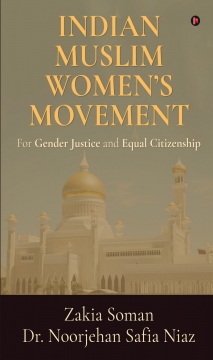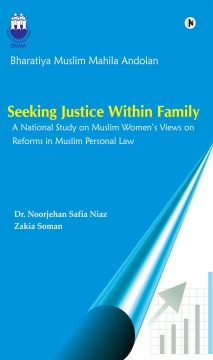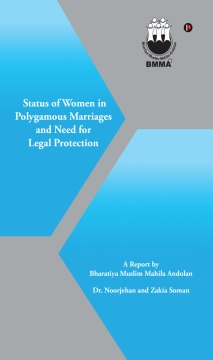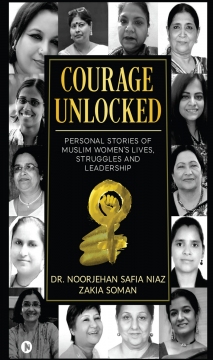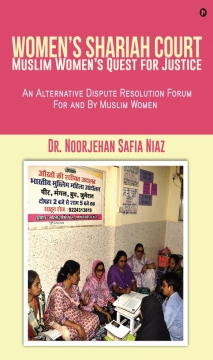
- Discover books
- For Writers
-
For Writers
-
Indie Author Championship
-
Challenges
Writing Contests
- Get Started

"It was a wonderful experience interacting with you and appreciate the way you have planned and executed the whole publication process within the agreed timelines.”
Subrat SaurabhAuthor of Kuch Woh Pal -
Dr. Noorjehan SafiaNiaz and ZakiaSoman
Noorjehan Safia Niaz has a Ph.D in Sociology from the Yashwantrao Chavan Maharashtra Open University and a MSW from the Tata Institute of Social Sciences, Mumbai. She worked as a development officer with Mahila Arthic Vikas Mahamandal, a Maharashtra State Government Corporation. She has also worked in YUVA, SAHARA-Anjuman-e-Islam and in Women’s Research and Action Group. Noorjehan Safia Niaz is the co-founder of Bharatiya Muslim Mahila Andolan, a mass based national movement for Muslim women. She is also the founding member and Managing Trustee of Ashana Trust. She has authored and co-autRead More...
Noorjehan Safia Niaz has a Ph.D in Sociology from the Yashwantrao Chavan Maharashtra Open University and a MSW from the Tata Institute of Social Sciences, Mumbai. She worked as a development officer with Mahila Arthic Vikas Mahamandal, a Maharashtra State Government Corporation. She has also worked in YUVA, SAHARA-Anjuman-e-Islam and in Women’s Research and Action Group.
Noorjehan Safia Niaz is the co-founder of Bharatiya Muslim Mahila Andolan, a mass based national movement for Muslim women. She is also the founding member and Managing Trustee of Ashana Trust. She has authored and co-authored four books on status and concerns of Muslim women, including one in Marathi. She taught gender and human rights and has written articles around issues of Muslim women in journals and books. She blogs to express her views on Muslim community and Muslim women and posts regularly on her facebook wall about her activities and programmes.
noorjehansafianiaz.blogspot.in
www.bmmaindia.com
Read Less...Crop your profile image

Indian Muslim Women’s Movement
Books by Zakia Soman And Dr. Noorjehan Safia Niaz
This collection of essays and articles captures the beginning of the Muslim women’s movement in India in the last two decades. Written at different points during the journey, these pieces provide a glimpse into the collective tumultuous journey of women demanding reform in Muslim family law in India and for equal citizenship without discrimination. This journey was undertaken by ordinary women under their own leadership. This collection highlights the ch
This collection of essays and articles captures the beginning of the Muslim women’s movement in India in the last two decades. Written at different points during the journey, these pieces provide a glimpse into the collective tumultuous journey of women demanding reform in Muslim family law in India and for equal citizenship without discrimination. This journey was undertaken by ordinary women under their own leadership. This collection highlights the challenges faced by women. It also celebrates successes such as the organization of women into groups, abolition of triple talaq and women’s entry into the mazar of Haji Ali Dargah. This book is a collection of articles written by authors, individually and jointly in various newspapers, magazines, journals and other publications. It challenges the misogynist regressive norms for women in family set by patriarchal religious groups. It calls for state accountability in providing safety, security and equality to Muslim citizens. Based on experiences and insights from grounded struggle of ordinary women, these essays give hope and provide strength in addressing discrimination through shared vision and collective democratic action. It calls out the failure of conservative religious leadership as well as elected representatives in providing an enabling environment to the community and particularly, women. It calls out certain feminists for their dual standards and for unsuccessful attempts to weaken the movement for reform in family law led by ordinary Muslim women.
Seeking Justice Within Family
Books by Dr. Noorjehan Safia Niaz, Zakia Soman
The Bharatiya Muslim Mahila Andolan was formed in January 2007 at a national conference in Delhi attended by 500 women from different parts of the country. It is a democratic organisation of Muslim women, led by Muslim women, and which strives for the citizenship rights of all and particularly Muslim women. The BMMA believes in the values of equality, justice, and fairness enshrined in the Holy Quran as well as the Constitution of India. In its 16th year, it�
The Bharatiya Muslim Mahila Andolan was formed in January 2007 at a national conference in Delhi attended by 500 women from different parts of the country. It is a democratic organisation of Muslim women, led by Muslim women, and which strives for the citizenship rights of all and particularly Muslim women. The BMMA believes in the values of equality, justice, and fairness enshrined in the Holy Quran as well as the Constitution of India. In its 16th year, it’s membership has crossed one lakh across 15 states. BMMA believes in democracy and secularism as propounded by the Constitution of India. We believe peace and justice to be the fundamental tenets of Islam. We oppose the denial of women’s rights in society and strive to build Muslim women’s leadership across the country. We work on the issues of education, livelihood, health, security, and law reform. We are opposed to communalism and violence and believe in communal harmony, mutual respect, and religious co-existence.
Status of Women in Polygamous Marriages and Need for Legal Protection
Books by Dr. Noorjehan And Zakia Soman
This book is a timely study on the status of Muslim women in polygamous marriages and reinforces the need for legislative protection of Muslim women. While the other religious communities enjoy the benefits of comprehensively codified family laws, Muslim women are without the protection of a law. Polygamy is an affront to a woman's dignity and a man must know that he cannot get away with it under the garb of religion. This book also looks into the impact of po
This book is a timely study on the status of Muslim women in polygamous marriages and reinforces the need for legislative protection of Muslim women. While the other religious communities enjoy the benefits of comprehensively codified family laws, Muslim women are without the protection of a law. Polygamy is an affront to a woman's dignity and a man must know that he cannot get away with it under the garb of religion. This book also looks into the impact of polygamy on the mental health of women and actually calls for more in-depth study on this aspect for women of all communities who face a polygamous husband. We hope that this publication will intensify Muslim women's call for ending polygamy.
Courage Unlocked
Books by Dr. Noorjehan Safia Niaz And Zakia Soman
In this book the authors have tried to fill up the pages of feminist history with the voices of Muslim women through their own lenses and their own voices. This collection of memoirs is meant to highlight the leadership potential and impact of a Muslim woman, her agency, her education, her fierce commitment and her fearlessness in the face of adversity. It is meant to create a historical record for future generations to inspire them and to educate them about t
In this book the authors have tried to fill up the pages of feminist history with the voices of Muslim women through their own lenses and their own voices. This collection of memoirs is meant to highlight the leadership potential and impact of a Muslim woman, her agency, her education, her fierce commitment and her fearlessness in the face of adversity. It is meant to create a historical record for future generations to inspire them and to educate them about the legacy that they have inherited. It is also meant to inspire more and more women to take up the charge of themselves, their community and their country.
Indian Muslim Women’s Movement
Books by Zakia Soman And Dr. Noorjehan Safia Niaz
This collection of essays and articles captures the beginning of the Muslim women’s movement in India in the last two decades. Written at different points during the journey, these pieces provide a glimpse into the collective tumultuous journey of women demanding reform in Muslim family law in India and for equal citizenship without discrimination. This journey was undertaken by ordinary women under their own leadership. This collection highlights the ch
This collection of essays and articles captures the beginning of the Muslim women’s movement in India in the last two decades. Written at different points during the journey, these pieces provide a glimpse into the collective tumultuous journey of women demanding reform in Muslim family law in India and for equal citizenship without discrimination. This journey was undertaken by ordinary women under their own leadership. This collection highlights the challenges faced by women. It also celebrates successes such as the organization of women into groups, abolition of triple talaq and women’s entry into the mazar of Haji Ali Dargah. This book is a collection of articles written by authors, individually and jointly in various newspapers, magazines, journals and other publications. It challenges the misogynist regressive norms for women in family set by patriarchal religious groups. It calls for state accountability in providing safety, security and equality to Muslim citizens. Based on experiences and insights from grounded struggle of ordinary women, these essays give hope and provide strength in addressing discrimination through shared vision and collective democratic action. It calls out the failure of conservative religious leadership as well as elected representatives in providing an enabling environment to the community and particularly, women. It calls out certain feminists for their dual standards and for unsuccessful attempts to weaken the movement for reform in family law led by ordinary Muslim women.
Women’s Shariah Court-Muslim Women’s Quest for Justice
Books by Dr. Noorjehan Safia Niaz
Would it be easy to imagine a court where justice is dispensed not by women and men wearing black flowing gowns but by ordinarily dressed, uneducated women? Muslim women living in slum communities of Mumbai took upon themselves the job of providing legal aid to other distressed women. Need for justice is as crucial as other needs, especially for women who face marginalization on a large scale. This book looks closely at the genesis of these groups, their histo
Would it be easy to imagine a court where justice is dispensed not by women and men wearing black flowing gowns but by ordinarily dressed, uneducated women? Muslim women living in slum communities of Mumbai took upon themselves the job of providing legal aid to other distressed women. Need for justice is as crucial as other needs, especially for women who face marginalization on a large scale. This book looks closely at the genesis of these groups, their history, their interventions, their motivations and their contributions to women’s movement.
The book suggests recommendations for strengthening alternative dispute resolution forums where justice will be dispensed not by learned lawyers but by ordinarily dressed unlettered women. These women, through their innate sense of justice reaches out passionately towards other equally battered women and together they journey towards a life of dignity.

Are you sure you want to close this?
You might lose all unsaved changes.
Select from one of our global stores to continue
 India
India
 Malaysia
Malaysia
 Singapore
Singapore
 UAE
UAE
Warning Message
The items in your Cart will be deleted, click ok to proceed.











